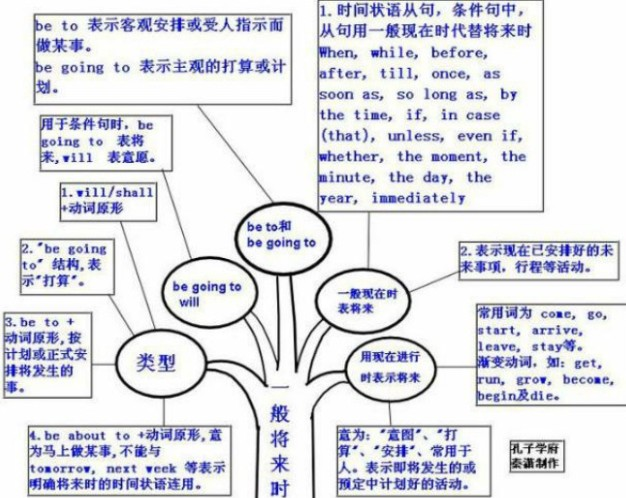高中英语知识点:一般将来时
逍遥右脑 2015-12-25 10:39
一般将来时的概念:
一般将来时表示将来某一时刻的发生动作或状态,或将来某一段时间内经常的动作或状态。常与表示将来的时间状语连用。
一般将来时用法:
1)shall用于第一人称,常被will所代替。will在陈述句中用于各人称,在征求意见时常用于第二人称。
例如:Which paragraph shall I read first?我先读哪一段呢?
Will you be at home at seven this evening? 今晚七点回家好吗?
2)be going to+不定式,表示将来。
a. 主语的意图,即将做某事。
例如:What are you going to do tomorrow? 明天打算作什么呢?
b. 计划,安排要发生的事。
例如:The play is going to be produced next month。这出戏下月开播。
c. 有迹象要发生的事。
例如:Look at the dark clouds, there is going to be a storm. 看那乌云,快要下雨了。
3)be+不定式表将来,按计划或正式安排将发生的事。
例如:We are to discuss the report next Saturday. 我们下星期六讨论这份报告。
4)be about to+不定式,意为马上做某事。
例如:He is about to leave for Beijing. 他马上要去北京。
注意:be about to do不能与tomorrow, next week 等表示明确将来时的时间状语连用。
一般将来时知识体系:

一般现在时表将来:
1)下列动词come, go, arrive, leave, start, begin, return的一般现在时可以表示将来,主要用来表示在时间上已确定或安排好的事情。
例如:The train leaves a tsix tomorrow morning. 火车明天上午六点开。
—When does the bus star? 汽车什么时候开?
—It stars in ten minutes. ?十分钟后。
2)以here, there等开始的倒装句,表示动作正在进行。
例如:Here comes the bus.=The bus is coming. 车来了。
There goes the bell.=The bell is ringing. 铃响了。
3)在时间或条件句中。
例如:When Bill comes(不是will come), ask him to wait for me. 比尔来后,让他等我。
I'll write to you as soon as I arrive there. 我到了那里,就写信给你。
4)在动词hope, take carethat,makesurethat等的宾语从句中。
例如:I hope they have a nice time next week. 我希望他们下星期玩得开心。
Make sure that the windows are closed before you leave the room. 离开房间前,务必把窗户关了。
现在进行时表示将来:
下列动词come, go, arrive, leave, start, begin, return等现在进行时可以表示将来。
例如:I'm leaving tomorrow. 明天我要走了。
Are you staying here till next week? 你会在这儿呆到下周吗?
相关高中英语知识点:一般将来时的被动语态
一般将来时的被动语态:
表示将来要发生的动作和存在的状况且主语是动作的承受着。由shall/will be+done构成。
一般将来时态的被动语态的基本结构的构成:
1、一般将来时态的被动语态的肯定式为:shall/will+be+done。(shall用于第一人称; will用于各种人称)
如:We shall be punished if we break the rule. 如果我们违反规定,我们将要受到惩罚。
The new film will be shown next Thursday. 这部新电影将在下周四上映。
2、一般将来时态的被动语态的否定式为:shall/will+not+be+done.(可缩写成shan't 或won't)
如:The meeting won't be held tomorrow. 明天不再举行会议。
The exhibition won't be put off till next week. 展览会将不会推迟到下周。
3、一般将来时态的被动语态的一般疑问句需将shall/will提到主语的前面。(回答用yes或no)
如:Won't water be turned into ice, if it is below freezing? 如果气温在冰点之下,水难道不会变成冰吗?
—Will the work be finished at once? 这项工作会立刻被完成吗?
—Yes, it will. ?是的,立刻就完成。
4、一般将来时态的被动语态的特殊疑问句为:疑问词+shall/will+S+be+done。
如:When will these books be published? 这些书将在什么时候被出版?
Whom will this book be written by? 谁来写这本书?
一般将来时态的被动语态的其他结构构成:
1、be going to be done:
如:Some old buildings are going to be put down. 一些旧的楼房将被推倒。
The problem isn't going to be discussed at the meeting tomorrow. 这个问题将不在明天的会议上被讨论。
—Arethesetreesgoingtobecutdown?这些树将被砍倒吗?
—Yes,they are. 是的,将被砍倒
2、be to be done:
如:The sports meet is to be held on April10. 运动会将于四月十日举行。
The machines are not to be repaired tonight. 今晚将不会修理这些机器。
—Are new textbooks to be published next week?新教科书将在下周出版吗?
—No, they aren't. 不,不是。
一般将来时态的被动语态的用法:
1、一般将来时态的被动语态的同它的主动语态一样,强调表示根据计划或安排将要发生的被动性动作。
如:The new film will be shown next Thursday. 这部新电影将在下周四上映。
A lot of athletes will be invited to Beijing. 好多运动员将被邀请到北京来。
2、在时间、条件状语从句中,常用一般现在时的被动语态代替一般将来时的被动语态。
如:When the dam is completed, the Changjiang River will be controlled. 当大坝竣工时,长江将得到控制。
If I am given enough time, I will go to Japan for my holiday. 如果我有足够的时间,我将去日本度假。
3、表示有固定性条件就有规律性被动结果。
如:Heated to100℃, water will be turned into steam. 加热到100度时,水将会变成蒸气。
If you speak in class, you will be punished. 如果你在课堂上讲话,你将会被惩罚。
版权声明:本文内容由互联网用户自发贡献,该文观点仅代表作者本人。本站仅提供信息存储空间服务,不拥有所有权,不承担相关法律责任。如发现本站有涉嫌抄袭侵权/违法违规的内容,请发送邮件至 lxy@jiyifa.cn 举报,一经查实,本站将立刻删除。